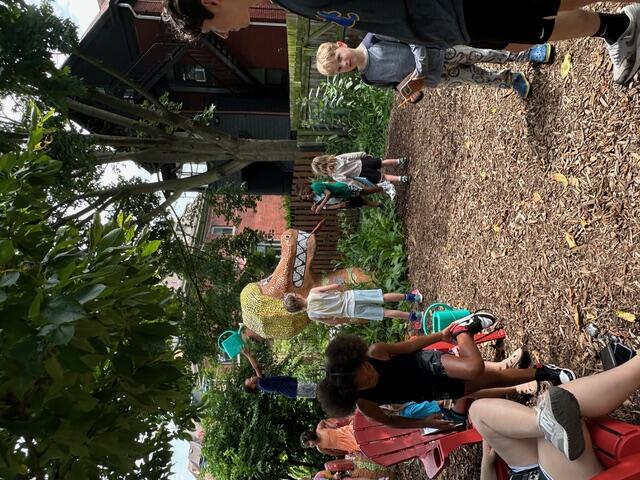A Conversation with an Octopus

The Octopus Garden, a community garden in Pittsburgh’s Friendship neighborhood created by Carnegie Mellon University’s School of Design’s Professor Kristin Hughes, was recently awarded a prestigious Food Justice Grant from the City of Pittsburgh’s Food Justice Fund (FJF). The purpose of the FJF is to increase public investment in a just, equitable, and sustainable food system that supports our neighborhoods, local economy, and the environment.
Founded in 2009, the Octopus Garden not only has raised beds for gardening, but it invites anyone to interact with it even if they’re not there to grow vegetables. Through its art installations, communal seating, and openness, it encourages visitors to exist in a space that cares about cultivating a communal and sustainable environment.
However, one can’t talk about the Octopus Garden without talking about Octavia, the beautiful, enormous mosaic octopus that watches over the Octopus Garden and everyone who comes to enjoy the space.
With the news of the Food Justice Grant, Kristin Hughes decided to have a one-on-one interview with Octavia about the grant, the garden and the community she watches over every day.
Take it away Octavia and Kristin!
Why don’t you introduce yourself, Octavia?

Well, hello there! I’m Octavia, the eight-armed mosaic guardian of the Octopus Garden. My three hearts do somersaults every time I see neighbors gathering here. For 17 years, I’ve had the best seat in the garden—though sitting still with eight legs is more complicated than you might think—watching families plant vegetables, kids discover hidden artworks, wedding proposals, first kisses, and even the crazy pollinators throwing dance parties.
Octavia, could you tell us how this garden began?
Once upon a time, this place was nothing but a burned-down apartment building. It was raw, wounded, and unloved. At first, some neighbors wanted the garden beds removed. But luckily, others saw potential, or I could be a charred octopus taco. They salvaged bricks, built beds, and planted seeds of hope. Over the years, what started as rubble grew into roots, new beginnings, and belonging. (And let me tell you, nothing tickles an octopus like sea-ing cucumbers flourishing.)
That history is important. The garden speaks for itself in many ways—its rhythms, growth, and shared harvest instill lifelong lessons in healthy eating, environmental responsibility, and the essential relationship between nature and people.
You just received the prestigious Food Justice Grant. Congrats! We heard it was highly competitive. What does this mean for you?

Oh, I could squeal with joy if my grout weren’t so stiff! This grant means we can finally expand our pollinator gardens (the bees practically buzzed the news themselves), add a new composting station (zucchini plants and carrot tops, your new forever home awaits!), and launch a mobile farm stand to share food with neighbors in Friendship, Garfield, and Bloomfield.
On a practical level, the funding ensures safer infrastructure, more food access, and healthier soil. Symbolically, it celebrates a community’s capacity to grow and change. For example, in 2012, we installed our first composting bins. Unfortunately, the community wasn’t ready. The bins quickly became dumping grounds for tires, diapers, and liquor bottles. Composting was a foreign concept at the time. Since then, much has changed.
Octavia, what does this garden give back to the community?
Besides the countless number of selfies? People come here for all sorts of reasons—to grow food, of course, but to read, to grieve, to rest, to celebrate. My eight tentacles can’t hold all the stories of resilience that sprout here.
And what’s next for the Octopus Garden?
Gardens are never finished. They grow, adapt, and surprise us. My dream? That more people find their way here and leave with their hands dirty, their hearts lighter, and their imaginations blooming. (Bonus points if someone teaches me how to knit—I’ve got eight arms, after all.)
I hope the Octopus Garden will continue to remind us that people and communities have the capacity to change. What was once rubble is now a cultural landmark and a sanctuary. The Octopus Garden is a model of social innovation. We can nurture resilience and self-reliance—not just here, but across our city and beyond. Every community needs an Octopus Garden.
Hughes would like to thank New Sun Rising, the neighborhoods of Friendship, Bloomfield, and Garfield, Pittsburgh City Council, the City of Pittsburgh, and everyone who continues to help the Octopus Garden be a special place where community thrives.